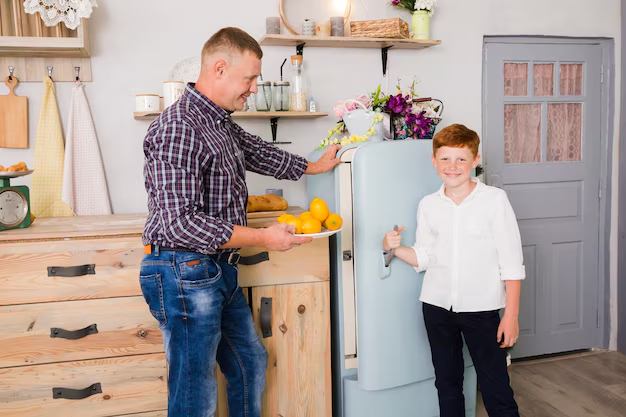How Long Can a Refrigerator Keep Its Cool? Unveiling the Secrets of Temperature Retention
In the hustle and bustle of modern life, refrigerators stand as silent sentinels, preserving the freshness of our food and the safety of our leftovers. But have you ever wondered how long a refrigerator can maintain its temperature, especially during a power outage? Understanding the nuances of your refrigerator's temperature retention abilities can help minimize food spoilage, improve energy efficiency, and ultimately save you money. With practical insights and expert perspectives, let's delve into the fascinating world of refrigerator temperature retention.
Unpacking the Basics: How Refrigerators Work
Before exploring how long a refrigerator holds its temperature, it's crucial to grasp the basics of its operation. Refrigerators function by removing heat from the interior, not by injecting cold air into the compartment. The compressor compresses a cooling gas, converting it into a hot, high-pressure gas. This gas then dissipates heat through coils, turning into a cool, low-pressure liquid that absorbs heat from the refrigerator's interior.
Key Factors Influencing Temperature Retention
Several elements dictate how long a refrigerator can sustain its temperature:
- Insulation Quality: Superior insulation helps maintain a stable internal temperature even when external conditions fluctuate.
- Refrigerator Type and Brand: Different designs and technologies influence temperature maintenance capabilities.
- Initial Temperature Setting: The factory or user-set temperature plays a role in retention efficacy.
- External Temperature: Surrounding environmental temperature can significantly affect performance.
- Frequency of Door Opening: Each time the door opens, warm air enters, and retaining the desired temperature takes longer.
The Role of Temperature Settings in Efficiency
Setting the right temperature is vital for energy efficiency and food preservation. Ideally, refrigerators should be set to maintain a steady temperature of around 37°F (3°C), and freezers at 0°F (-18°C). Sticking to these recommendations helps in energy conservation and extends food freshness. Consider the following tips:
- Avoid Overloading: Air needs ample space to circulate, so avoid cramming your fridge.
- Organize Strategically: Place commonly used items in front to minimize door-opening time.
- Regular Maintenance: Clean the coils and ensure door seals are intact to optimize efficiency.
How Long Can a Refrigerator Hold Temperature During a Power Outage?
The longevity of your refrigerator's temperature retention in a power outage largely depends on the factors mentioned. Typically, a refrigerator can keep food safely cold for about four to six hours, while a freezer can maintain its temperature for 24 to 48 hours, provided doors remain closed.
Tips to Maximize Temperature Retention Without Power
To make the most of your refrigerator's ability to hold temperature:
- Minimize Door Openings: Only open when absolutely necessary to retain cool air.
- Use Ice Packs: Place frozen gel packs strategically around perishable items.
- Cluster Frozen Goods: A full freezer retains cold better than an empty one.
- Prioritize Foods: Consume perishables first, and avoid opening the fridge unless necessary.
The Impact of Rapid Temperature Changes
Fluctuations in temperature can lead to food spoilage. Rapid changes cause the fridge to work harder, using more energy and potentially reducing the appliance's lifespan. Here’s how to mitigate these changes:
- Avoid Hot Foods: Allow hot dishes to cool before refrigerating to avoid raising internal temperatures.
- Check Seals: Ensure door seals are airtight to prevent warm air intrusion.
- Location Matters: Place refrigerators away from heat sources and direct sunlight.
The Efficiency Edge: Smart Refrigerators
With advancing technology, smart refrigerators offer enhanced temperature management features, including Wi-Fi connectivity, automated alerts, and precise temperature control. These capabilities not only help in consistent temperature retention but also provide peace of mind during uncertainties like power outages.
Advantages of Smart Refrigerators
- Real-Time Monitoring: Immediate notifications aid in prompt responses.
- Energy Management: Optimize usage with eco-friendly modes.
- Remote Control: Alter settings from your smartphone to cater to dynamic needs.
Practical Tips for Enhanced Refrigeration Efficiency
Reflecting on the insights shared, here’s a quick guide to ensure your fridge operates efficiently:
Key Takeaways for Refrigerator Usage:
- 🔋 Keep It Cool: Regularly check settings to maintain ideal internal temperatures (37°F for the fridge, 0°F for the freezer).
- 🔄 Strategic Organization: Arrange items to minimize door opening times and facilitate air circulation.
- 🧊 Stock Wisely: A packed freezer retains cold better; use plastic bottles filled with water if necessary.
- 🚪 Seal it Right: Regularly inspect door seals for air tightness.
- 🌞 Avoid Heat Sources: Position the appliance away from ovens, radiators, and direct sunlight.
Final Insight: Empower Your Kitchen Routine
Understanding how your refrigerator holds its temperature isn't just about gadgets or tech—it’s about leveraging knowledge to foster a sustainable living environment while ensuring food safety. With insights into operational mechanisms and tips on maximizing efficiency, you're now equipped to make informed decisions that truly benefit your home. Whether it’s preparing for a storm-induced power outage or simply enhancing daily routines, fostering an environment where your refrigerator performs at its best is a worthwhile endeavor that can yield significant dividends in reliability and performance.

